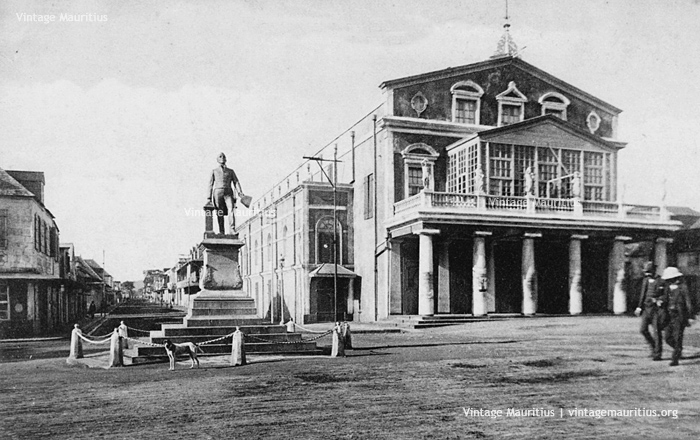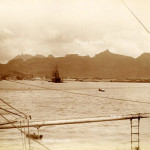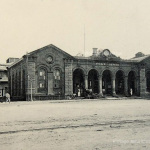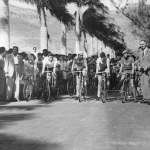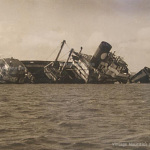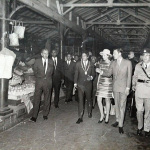Pope Hennessy Street is named after one of the most appreciated Governors of the island during the British occupation period, and Sir Pope Hennessy reigned as governor between 1883 and 1889. If taken at full straight length, this street comprises of 3 sections; Pope Hennessy Street, Jules Koenig Street and Intendance Street, for a total distance of 1Km from Champ de Mars to Place D’Armes, and vice versa.
Sir Pope Hennessy as Governor of Mauritius
When Pope Hennessy was declared Governor, there were quite some doubts about his rulership from the inhabitants and medias since the last acting governor, Sir Napier Broome, wasn’t that well acclaimed. Somehow, it was decided to appraise the Governor after knowing his intentions and his leadership skills.
Sir John Pope Hennessy, K.C.M.G., who took command of Mauritius in June, 1883, soon asserted himself as the true friend of the colonists, and expressed his surprise at their being deliberately shut out from some of the higher posts in the Civil Service, which should be theirs by right. After having ascertained that the reform question was still one of the constant wishes of the people, he took up the matter himself, recommending it to the new Secretary of State, Lord Derby, of whose liberal views he was well aware. The Mauritians’ request, so warmly supported, was granted contrary to all expectations; but, of course, this had created much discontent amongst the English section of the community, who, apart from prejudice against a Governor who was both a Roman Catholic and an Irishman, whose prior conduct in the different colonies he had administered had been compared to “an angry boil on the body of the Empire,” could not tolerate the idea of being deprived of a monopoly so long established that they had come to that they had come to regard it as their undoubted patrimony. They strove, therefore, to have the measure revoked, in which they succeeded through a further change in the Colonial Office. Nevertheless, the principle itself, the election of members, was left untouched, but most of the privileges accorded were now encroached upon, or turned from their original intent. With this the Mauritians had to acquiesce, and the result was the present Constitution, promulgated on the 25th October, 1885.
The first elections took place in January, 1886, and gave rise to acute party feeling. The reformists, being at variance on certain points, separated into two groups, the Conservatives and the so-called Democrats. The members belonging to the latter party, four in all, were gained over by the anti-reformists to oppose the Governor, against whom were lodged accusations which proved perfectly groundless. It was seriously alleged, among other grievances, that the Fenian, as they politely termed him, actually sought to make the question of Home Rule in Mauritius auxiliary to that of Home Rule in Ireland, in view of an. eventual separation !!!
The political strife went steadily on, the opposition being avowedly headed by the Colonial Secretary himself, Mr. Clifford Lloyd, who managed at last to secure an inquiry into Sir John’s administration, under the astounding pretence that his mind was hopelessly deranged !!! Sir Hercules Robinson, Commissioner-General of the Cape of Good Hope, was chosen for thatunpleasant purpose, and, after a sham investigation which lasted but a few days, availed himself of his commission, and suddenly suspended Sir John Pope Hennessy. He himself then assumed the governorship (14th December, 1886), which two days later he handed over to Major-General Hawley, and returned to South Africa.
Sir John Pope Hennessy left Mauritius in the following March; thoroughly determined to clear himself before the Secretary of State of the aspersion made upon his character. He had, however, been preceded by the Hon. (later Sir) William Newton, a Mauritian barrister of note and one of his firmest admirers, whom the people had entrusted with a petition to Her Majesty demanding the reinstation of Sir John, and with the care of defending him before the Privy Council. Even those who had not entirely approved Sir John’s policy now forgot their grievances and gave vent to their indignation at such a scandalous excess of power!
Sir John Pope Hemressy was reinstated, and his return to Mauritius was the occasion of an unprecedented popular manifestation. The latter part of his government was peaceful ; he devoted all his care to the development of agriculture and industry ; he did much to encourage all kinds of secondary plantations, the importance of which he had fully realized. Tea growing in this island is due to him, and, had time permitted, he would have started the india-rubber industry. Another boon, and not the least, was the damming up of Mare aux Vacoas, thereby permitting the distribution of pure water in some of the most populous districts of the island. Apart from these achievements and his unbounded charity towards the poor, his constant and reliable friendship towards the people of Mauritius would have been sufficient for the great popularity in which he was held by all classes in the island.
Twenty years later, on the 22nd December, 1908, a statue was erected in front of the Port Louis Theatre, at the lower end of Government Street which now bears his name, to the memory of a man who, barring a few errors, had been one of the best Governors this colony ever possessed.

